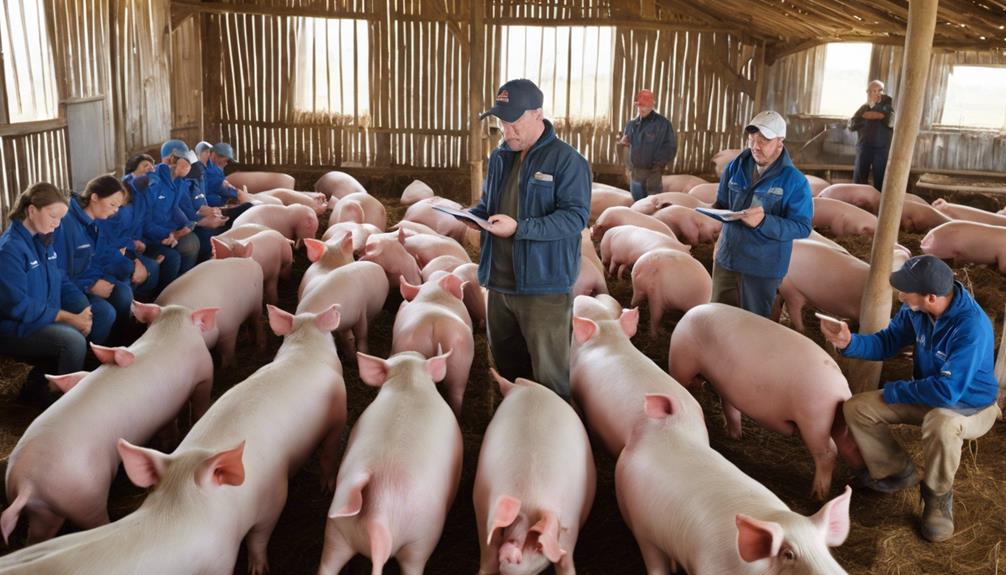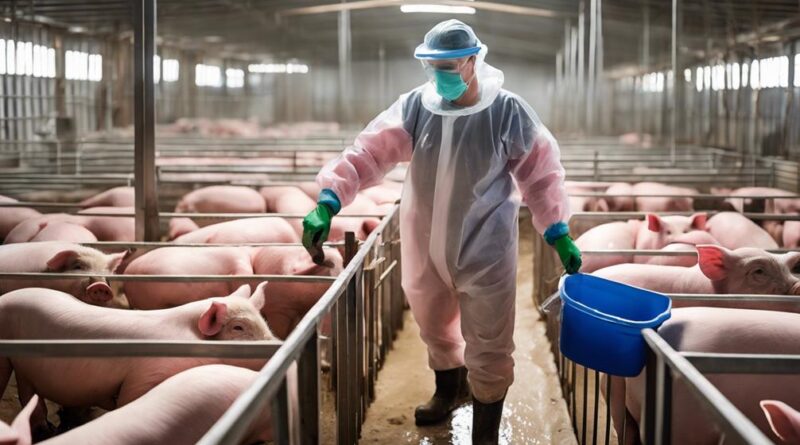Preventing Zoonotic Diseases: Tips From Pig Farming
When caring for pigs, you might not realize the potential risks that come with it. Understanding how zoonotic diseases can easily transfer from pigs to humans is crucial in protecting yourself and others.
By implementing specific practices on your farm, you can significantly reduce the chances of contracting these illnesses.
Stay tuned to discover essential tips and strategies from pig farming that can help safeguard your health and well-being.
Potential Zoonotic Diseases From Pigs
To prevent zoonotic diseases from pig farming, it's crucial to understand the potential health risks associated with raising pigs. Disease prevention and proper hygiene practices are essential in mitigating the spread of zoonotic diseases that can be transmitted from pigs to humans. Maintaining good hygiene standards such as regular handwashing, proper sanitation of living areas, and wearing protective equipment can significantly reduce the risk of infections.
One of the concerning issues related to pig farming is antibiotic resistance and its public health implications. Antibiotics are commonly used in pig farming for disease prevention and growth promotion. However, the overuse and misuse of antibiotics in pigs can lead to the development of antibiotic-resistant bacteria. If these resistant bacteria are transmitted to humans through direct contact with pigs or consumption of contaminated pork products, it can pose a severe threat to public health by limiting treatment options for bacterial infections.
To address the issue of antibiotic resistance, it's crucial for pig farmers to follow responsible antibiotic use practices, such as using antibiotics only when necessary and under veterinary supervision. Additionally, regular monitoring for antibiotic residues in pork products and promoting alternatives to antibiotics for disease prevention in pigs can help in reducing the risk of antibiotic resistance spreading to humans. By being mindful of these factors, pig farmers can play a vital role in preventing zoonotic diseases and safeguarding public health.
Transmission Routes of Zoonotic Diseases
Understanding the various ways zoonotic diseases can be transmitted is crucial in effectively preventing their spread from pig farming to humans. When it comes to animal handling, direct contact with infected pigs or their bodily fluids is a common route of transmission for zoonotic diseases. Proper handling techniques, such as wearing protective gear like gloves and masks, can significantly reduce the risk of contracting these illnesses.
Environmental contamination is another key factor in the transmission of zoonotic diseases. Pigs can shed pathogens in their feces, which can contaminate the surrounding environment. It's essential to maintain clean and sanitized pig pens, as well as properly dispose of feces and other waste to prevent the spread of diseases.
Personal hygiene plays a critical role in disease prevention. Washing hands thoroughly with soap and water after handling pigs or being in their environment can help eliminate any potential pathogens that may have been picked up. Additionally, avoiding touching your face or consuming food in pig farming areas can further reduce the risk of infection.
High-Risk Activities on Pig Farms
Engaging in certain activities on pig farms poses a high risk of zoonotic disease transmission to humans. To minimize this risk, it's crucial to be aware of potential high-risk activities and take necessary precautions. Here are some key points to consider:
- Biohazard management: Properly handle and dispose of animal waste to prevent the spread of pathogens.
- Personal hygiene: Wash hands thoroughly with soap and water after handling pigs or being in their environment.
- Disease prevention: Vaccinate pigs against common diseases to reduce the risk of transmission to humans.
- Risk assessment: Regularly assess the farm environment for potential hazards and implement measures to mitigate risks.
- Proper use of protective gear: Wear appropriate personal protective equipment, such as gloves and masks, when working closely with pigs.
Common Zoonotic Diseases in Pig Farmers
Minimizing the risk of zoonotic diseases on pig farms involves understanding the common diseases that can affect pig farmers. As a pig farmer, you face various occupational hazards that can lead to zoonotic infections. One of the most common zoonotic diseases in pig farmers is swine flu, also known as H1N1 influenza. This virus can be transmitted from pigs to humans, especially when there's close contact with infected animals. To prevent swine flu and other zoonotic diseases, proper hygiene practices such as regular hand washing and wearing protective gear like gloves and masks are essential.
Another prevalent zoonotic disease among pig farmers is leptospirosis, which is caused by bacteria found in the urine of infected animals. Contact with contaminated urine or water can lead to infection, resulting in flu-like symptoms. To reduce the risk of contracting leptospirosis, it's crucial to avoid direct contact with pig urine and ensure proper sanitation measures are in place on the farm.
Strategies to Prevent Zoonotic Infections
To prevent zoonotic infections on your pig farm, implement strict biosecurity measures. Maintaining high standards of personal hygiene is crucial in reducing the risk of zoonotic diseases. Ensure that all workers wash their hands thoroughly with soap and water before and after handling pigs or their waste. Additionally, wearing appropriate protective gear such as gloves and boots can further prevent the spread of pathogens from animals to humans.
Strategies to Prevent Zoonotic Infections:
- Personal hygiene: Emphasize the importance of handwashing and proper hygiene practices among all farm workers to minimize the transmission of diseases.
- Animal vaccination: Stay up to date with the recommended vaccination schedules for your pigs to prevent the spread of zoonotic pathogens within the herd.
- Regular health checks: Implement routine health checks for your pigs to promptly identify and address any signs of illness that could pose a zoonotic risk.
- Segregation of sick animals: Isolate pigs that show symptoms of illness to prevent the spread of potential zoonotic agents to other healthy animals or farm workers.
- Proper waste management: Establish proper disposal methods for animal waste to reduce environmental contamination and lower the risk of zoonotic disease transmission.
Importance of Biosecurity Measures
To ensure the health and safety of both your pigs and your farm workers, prioritizing biosecurity measures is essential in preventing the spread of zoonotic diseases. Implementing effective biosecurity practices based on research is crucial for disease prevention on your pig farm. By utilizing the latest technology in biosecurity, such as automated monitoring systems and advanced disinfection techniques, you can significantly reduce the risk of zoonotic infections.
Conducting thorough research to understand the specific biosecurity needs of your pig farm is fundamental. Tailoring your biosecurity practices based on this research can help create a robust defense system against zoonotic diseases. Regularly reviewing and updating your biosecurity protocols in line with the latest research findings and technological advancements is key to staying ahead of potential disease threats.
Investing in biosecurity technology can provide innovative solutions for disease prevention. Automated systems for monitoring pig health, controlling access to farm areas, and managing waste disposal can enhance the overall biosecurity of your operation. Embracing these technological advancements can streamline biosecurity practices, making them more efficient and effective in safeguarding both your pigs and farm workers from zoonotic diseases. Remember, staying proactive and informed in implementing biosecurity measures is vital for maintaining a healthy environment on your pig farm.
Training and Education for Pig Farmers

Prioritizing training and education for pig farmers is essential for enhancing biosecurity practices and preventing zoonotic diseases on your farm. By investing time and resources into educating yourself and your staff, you can significantly reduce the risk of disease transmission and ensure the health and safety of both your animals and your community.
- Training Methods:
- Regular workshops and seminars on biosecurity measures and zoonotic disease prevention.
- Hands-on training sessions for proper sanitation techniques and waste management.
- Utilization of online resources and webinars for continuous learning and updates on best practices.
- Mentorship programs with experienced farmers to learn practical tips and tricks.
- Simulation exercises to practice emergency response procedures in case of disease outbreaks.
Implementing safety protocols is crucial to minimize the potential spread of diseases. Ensure that all staff members are well-versed in these protocols and adhere to them rigorously. Regularly review and update safety guidelines to stay current with the latest recommendations from health authorities. By enforcing strict safety measures and providing ongoing training, you can create a culture of awareness and responsibility that will safeguard your farm against zoonotic threats.
Collaboration With Public Health Authorities
Engaging with public health authorities is key in establishing effective strategies for preventing and managing zoonotic diseases in pig farming. Collaboration with these authorities allows for a coordinated approach towards disease surveillance and risk assessment. By working together, pig farmers can benefit from the expertise and resources that public health authorities bring to the table.
Disease surveillance is a crucial aspect of preventing zoonotic diseases. Public health authorities have the tools and knowledge to monitor disease outbreaks, track potential sources of infection, and identify patterns that can help prevent future outbreaks. By sharing information with these authorities, pig farmers can contribute to early detection and containment efforts, ultimately reducing the spread of diseases.
Risk assessment is another vital component of zoonotic disease prevention. Public health authorities can conduct thorough assessments to identify potential hazards on pig farms that may contribute to disease transmission. By collaborating with these authorities, pig farmers can implement targeted interventions to mitigate risks and create a safer environment for both animals and humans.
Frequently Asked Questions
Can Zoonotic Diseases From Pigs Be Transmitted Through the Consumption of Pork Products?
When consuming pork products, be aware that zoonotic diseases from pigs can be transmitted. Proper meat safety practices are crucial to prevent the spread of these diseases.
Understanding the risks associated with pork consumption and being informed about pig farming practices can help you make informed decisions to protect yourself and others from potential health hazards.
Stay vigilant and prioritize food safety to minimize the risk of contracting zoonotic diseases.
How Often Should Pig Farmers Undergo Medical Screenings for Zoonotic Diseases?
To stay healthy, pig farmers should prioritize medical surveillance for zoonotic diseases. Regular health screenings are crucial for prevention. Consider scheduling these screenings on a routine basis to catch any potential issues early on.
Are There Any Specific Regulations in Place for Pig Farmers to Prevent the Spread of Zoonotic Diseases?
To keep zoonotic diseases in check, regulatory compliance is crucial for pig farmers. Following biosecurity measures helps prevent the spread of these illnesses. Ensure you adhere to specific regulations set in place for pig farming to maintain a safe environment and protect both animals and humans.
Implementing proper biosecurity measures is essential in stopping the transmission of zoonotic diseases within your farm and beyond.
Is There a Risk of Zoonotic Diseases Spreading From Pigs to Other Animals on the Farm?
When considering the risk assessment of zoonotic diseases spreading from pigs to other animals on the farm, it's crucial to implement strict biosecurity measures.
Maintaining separate living spaces, controlling visitors' access, and ensuring proper hygiene practices can help minimize the chances of disease transmission.
How Can Pig Farmers Ensure the Proper Disposal of Contaminated Materials to Prevent Zoonotic Infections?
To ensure proper disposal of contaminated materials on the farm, segregate waste bins for different types of waste. Label them clearly to avoid mix-ups. Use leak-proof containers to prevent spills and contamination.
Regularly empty and clean the bins to maintain hygiene. Implement a waste management plan that includes proper disposal methods for different types of contaminants.
Conclusion
In conclusion, by following biosecurity measures, practicing good hygiene, and staying informed about zoonotic diseases, you can greatly reduce the risk of contracting illnesses from pigs.
Remember to collaborate with public health authorities and seek training and education to stay updated on best practices.
With these strategies in place, you can protect yourself and others from potential zoonotic infections on pig farms.
Stay safe and prioritize your health!
